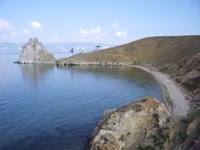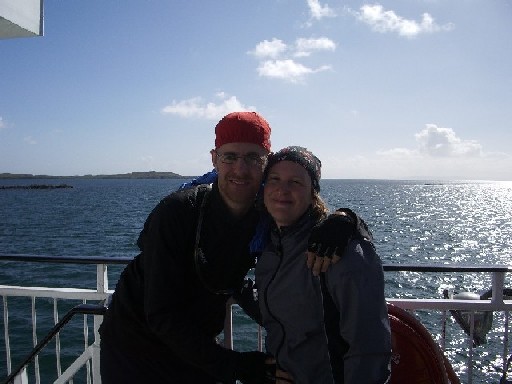Olkhon Island - Something Fishy.
Having left the comfort-zone of our cabin, it was back to the real world of not being able to read any signs or comprehend what the natives were jibbering at us. After a vaguely worrying taxi journey, some frantic finger pointing and hand waving, a smattering of stilted, mispronounced Russian from the phrasebook (cheers ISD) and a three hour wait in the bus station we found ourselves in a minibus heading for Olkhon Island on Lake Baikal. A six hour journey ensued (with a beetroot soup stop after two hours) before we were dumped on the dusty streets of Khuzir (the main settlement on Olkhon). The town is like something out of a modern day cowboy movie; the mean streets are ruled by fearsome cows, packs of feral dogs and gun-toting kids on motorbikes with sidecars.
Our home for six nights was Nikitas Homestead where we were treated to three hearty meals a day - mostly including delicious, freshly caught local fish (omul). Nikitas is a hodge-podge of wooden cabins, yurts, sheep, woodpiles,vegetable patches, randy dogs, chemical toilets and banyas. For the uneducated amongst you, a banya is an integral part of Russian life. The "banya experience" involves a dry sauna, steambath, a stiff beating with sprigs of birch leaves followed by a plunge into a barrell of ice-cold water. A thoroughly invigorating experience - especially the birching!

Our time on Olkhon was spent relaxing and exploring the island - which for all you stats freaks out there is 71.7km long, with a maximum width of 15km, an area of 730sq km and a population of 1500 (most of whom live in Khuzir). The island is the geographical, historical and sacred centre of Lake Baikal; the focus of old legends and ancient traditions. It concentrates all the diversity of natural landscapes typical of Baikal's shore area - soaring majestic cliffs, vast deserted sandy beaches and dunes, mysterious rocky coves and rolling, forested hills and valleys (*cough*, excuse me while I extract our guidebook from my gullet)
A local shaman also informed us that Olkhon means "dry island" due to it's miniscule annual precipitation levels. We experienced both precipitation and frozen precipitation during our stay.
The following paragraph is FAO ISD HIG; OK?:
During our six days on the island we carried out an above average number of t-tests. We are 95% confident that the black tea is significantly more palatable than the green, rhodedendran and berry teas (pee<0.05). Hopefully such detailed and useful statistical analysis (well at least as useful as any of the stuff the rest of you wasters are doing) will count towards the 10 days we're contractually obliged to work during our year away. If someone could arrange for finance to transfer the money into our accounts that would be great - cheers!
Cribbage Update: Jools breaks back in style with world record score of 24 - Jools 4 Kev 3
PS - having some problems posting photos at the moment. Hopefully add more later.



0 Comments:
Post a Comment
<< Home